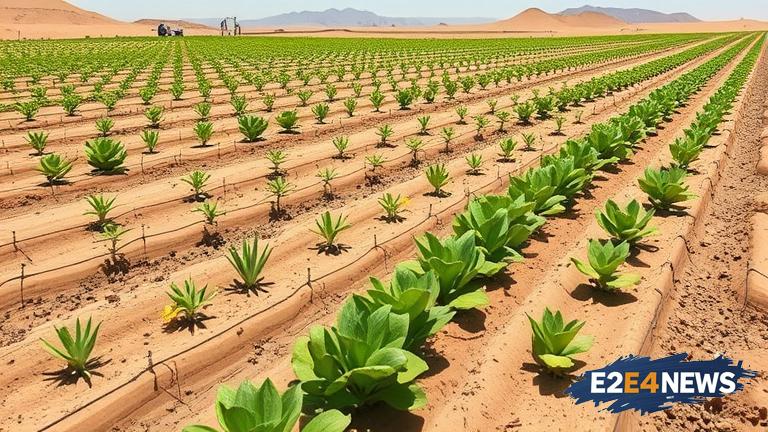Israel, a country known for its innovative approach to agriculture, has been at the forefront of developing and implementing cutting-edge desert farming techniques. These methods have been designed to boost crop yields, reduce water consumption, and promote sustainable farming practices. The Israeli government has invested heavily in research and development, working closely with farmers, scientists, and technology companies to create a thriving agricultural sector. One of the key techniques being used is precision irrigation, which involves using advanced sensors and drones to monitor soil moisture levels and optimize water usage. This approach has been shown to increase crop yields by up to 30% while reducing water consumption by up to 50%. Another technique being used is hydroponics, which involves growing plants in nutrient-rich solutions rather than soil. This method allows for greater control over the growing environment, reducing the need for pesticides and fertilizers. Israeli farmers are also using advanced greenhouses, which are designed to regulate temperature, humidity, and light levels, creating optimal growing conditions for a wide range of crops. The use of drones and satellite imaging is also becoming increasingly popular, allowing farmers to monitor crop health, detect pests and diseases, and predict yields. These innovative techniques are not only improving crop yields but also reducing the environmental impact of farming. By using less water and reducing the need for chemical pesticides and fertilizers, Israeli farmers are helping to protect the country’s natural resources. The success of these desert farming techniques has also attracted international attention, with many countries seeking to learn from Israel’s experience. The Israeli government has established a number of programs to support the development of agriculture in arid regions, including the establishment of a desert agriculture research center. This center is working to develop new technologies and techniques that can be used to improve crop yields and reduce water consumption in desert regions around the world. The use of renewable energy sources, such as solar and wind power, is also being explored, with many farms using these sources to power their operations. In addition to the environmental benefits, these desert farming techniques are also having a positive impact on the economy. The agricultural sector is a significant contributor to Israel’s economy, and the use of these innovative techniques is helping to increase exports and create new job opportunities. The development of these techniques is also having a positive impact on food security, with Israel becoming a major producer of fresh produce. The country’s farmers are now able to grow a wide range of crops, including fruits, vegetables, and grains, which are being exported to countries around the world. The success of Israel’s desert farming techniques is a testament to the country’s innovative spirit and its commitment to sustainable agriculture. As the global population continues to grow, the need for sustainable and efficient farming practices will become increasingly important. Israel’s experience in this area is likely to play a significant role in shaping the future of agriculture, and its innovative desert farming techniques are set to become a model for other countries to follow. The use of technology, such as artificial intelligence and machine learning, is also being explored, with many farmers using these tools to optimize crop yields and reduce waste. Overall, Israel’s desert farming techniques are a major success story, and the country’s experience in this area is likely to have a significant impact on the future of agriculture. With its innovative approach to farming, Israel is helping to promote sustainable agriculture, reduce the environmental impact of farming, and improve food security. The country’s commitment to research and development, and its willingness to adopt new technologies and techniques, is driving innovation in the agricultural sector, and its experience is likely to be studied by countries around the world.
